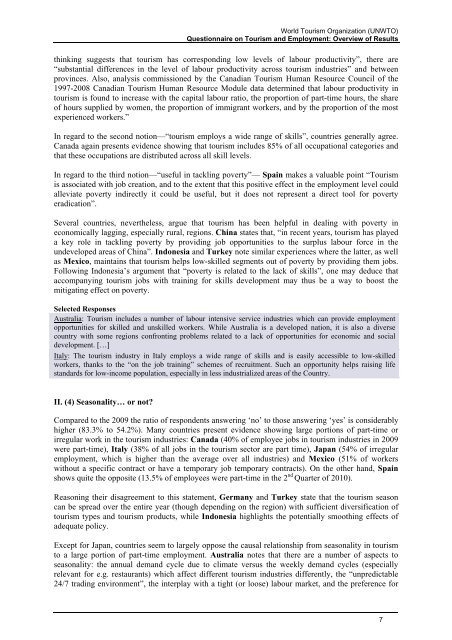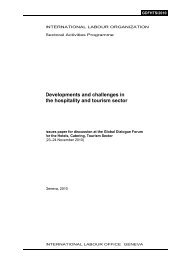Questionnaire on Tourism and Employment: Overview of Results
Questionnaire on Tourism and Employment: Overview of Results
Questionnaire on Tourism and Employment: Overview of Results
Create successful ePaper yourself
Turn your PDF publications into a flip-book with our unique Google optimized e-Paper software.
World <strong>Tourism</strong> Organizati<strong>on</strong> (UNWTO)<br />
<str<strong>on</strong>g>Questi<strong>on</strong>naire</str<strong>on</strong>g> <strong>on</strong> <strong>Tourism</strong> <strong>and</strong> <strong>Employment</strong>: <strong>Overview</strong> <strong>of</strong> <strong>Results</strong><br />
thinking suggests that tourism has corresp<strong>on</strong>ding low levels <strong>of</strong> labour productivity”, there are<br />
“substantial differences in the level <strong>of</strong> labour productivity across tourism industries” <strong>and</strong> between<br />
provinces. Also, analysis commissi<strong>on</strong>ed by the Canadian <strong>Tourism</strong> Human Resource Council <strong>of</strong> the<br />
1997-2008 Canadian <strong>Tourism</strong> Human Resource Module data determined that labour productivity in<br />
tourism is found to increase with the capital labour ratio, the proporti<strong>on</strong> <strong>of</strong> part-time hours, the share<br />
<strong>of</strong> hours supplied by women, the proporti<strong>on</strong> <strong>of</strong> immigrant workers, <strong>and</strong> by the proporti<strong>on</strong> <strong>of</strong> the most<br />
experienced workers.”<br />
In regard to the sec<strong>on</strong>d noti<strong>on</strong>—“tourism employs a wide range <strong>of</strong> skills”, countries generally agree.<br />
Canada again presents evidence showing that tourism includes 85% <strong>of</strong> all occupati<strong>on</strong>al categories <strong>and</strong><br />
that these occupati<strong>on</strong>s are distributed across all skill levels.<br />
In regard to the third noti<strong>on</strong>—“useful in tackling poverty”— Spain makes a valuable point “<strong>Tourism</strong><br />
is associated with job creati<strong>on</strong>, <strong>and</strong> to the extent that this positive effect in the employment level could<br />
alleviate poverty indirectly it could be useful, but it does not represent a direct tool for poverty<br />
eradicati<strong>on</strong>”.<br />
Several countries, nevertheless, argue that tourism has been helpful in dealing with poverty in<br />
ec<strong>on</strong>omically lagging, especially rural, regi<strong>on</strong>s. China states that, “in recent years, tourism has played<br />
a key role in tackling poverty by providing job opportunities to the surplus labour force in the<br />
undeveloped areas <strong>of</strong> China”. Ind<strong>on</strong>esia <strong>and</strong> Turkey note similar experiences where the latter, as well<br />
as Mexico, maintains that tourism helps low-skilled segments out <strong>of</strong> poverty by providing them jobs.<br />
Following Ind<strong>on</strong>esia’s argument that “poverty is related to the lack <strong>of</strong> skills”, <strong>on</strong>e may deduce that<br />
accompanying tourism jobs with training for skills development may thus be a way to boost the<br />
mitigating effect <strong>on</strong> poverty.<br />
Selected Resp<strong>on</strong>ses<br />
Australia: <strong>Tourism</strong> includes a number <strong>of</strong> labour intensive service industries which can provide employment<br />
opportunities for skilled <strong>and</strong> unskilled workers. While Australia is a developed nati<strong>on</strong>, it is also a diverse<br />
country with some regi<strong>on</strong>s c<strong>on</strong>fr<strong>on</strong>ting problems related to a lack <strong>of</strong> opportunities for ec<strong>on</strong>omic <strong>and</strong> social<br />
development. […]<br />
Italy: The tourism industry in Italy employs a wide range <strong>of</strong> skills <strong>and</strong> is easily accessible to low-skilled<br />
workers, thanks to the “<strong>on</strong> the job training” schemes <strong>of</strong> recruitment. Such an opportunity helps raising life<br />
st<strong>and</strong>ards for low-income populati<strong>on</strong>, especially in less industrialized areas <strong>of</strong> the Country.<br />
II. (4) Seas<strong>on</strong>ality… or not?<br />
Compared to the 2009 the ratio <strong>of</strong> resp<strong>on</strong>dents answering ‘no’ to those answering ‘yes’ is c<strong>on</strong>siderably<br />
higher (83.3% to 54.2%). Many countries present evidence showing large porti<strong>on</strong>s <strong>of</strong> part-time or<br />
irregular work in the tourism industries: Canada (40% <strong>of</strong> employee jobs in tourism industries in 2009<br />
were part-time), Italy (38% <strong>of</strong> all jobs in the tourism sector are part time), Japan (54% <strong>of</strong> irregular<br />
employment, which is higher than the average over all industries) <strong>and</strong> Mexico (51% <strong>of</strong> workers<br />
without a specific c<strong>on</strong>tract or have a temporary job temporary c<strong>on</strong>tracts). On the other h<strong>and</strong>, Spain<br />
shows quite the opposite (13.5% <strong>of</strong> employees were part-time in the 2 nd Quarter <strong>of</strong> 2010).<br />
Reas<strong>on</strong>ing their disagreement to this statement, Germany <strong>and</strong> Turkey state that the tourism seas<strong>on</strong><br />
can be spread over the entire year (though depending <strong>on</strong> the regi<strong>on</strong>) with sufficient diversificati<strong>on</strong> <strong>of</strong><br />
tourism types <strong>and</strong> tourism products, while Ind<strong>on</strong>esia highlights the potentially smoothing effects <strong>of</strong><br />
adequate policy.<br />
Except for Japan, countries seem to largely oppose the causal relati<strong>on</strong>ship from seas<strong>on</strong>ality in tourism<br />
to a large porti<strong>on</strong> <strong>of</strong> part-time employment. Australia notes that there are a number <strong>of</strong> aspects to<br />
seas<strong>on</strong>ality: the annual dem<strong>and</strong> cycle due to climate versus the weekly dem<strong>and</strong> cycles (especially<br />
relevant for e.g. restaurants) which affect different tourism industries differently, the “unpredictable<br />
24/7 trading envir<strong>on</strong>ment”, the interplay with a tight (or loose) labour market, <strong>and</strong> the preference for<br />
7



